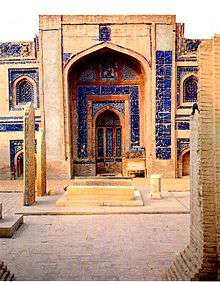Mosques of Multan
Multan, Pakistan has some of the oldest mosques, some of which are attractions. These mosques are relics of Multan's 1000-year-old Islamic heritage.
Masjid Khaliq Wali
The first mosque built in Multan, constructed with carved bricks, located on old matital road. Ruins of this mosque are still visible.
Jamia Mosque
The first mosque built in Multan was the Jamia Mosque, which was constructed on the orders of Mohammad Bin Qasim. Ruins of this mosque were visible till 1954 at Qasim Bella, but were washed away by the repeated floods of the river Chenab.
Eid Gah Mosque
This grand mosque of Multan is located on the main Multan-Lahore highway in the Northeast of the city. It was built in 1735 AD by Khokhar family and Nawab Abdul Samad Khan and when he was the Mughal governor of Multan. It is very spacious, provided with a vast courtyard and a huge prayer chamber measuring 250 feet by 55 feet and crowned by seven domes. Its exterior was faced with glazed blue tiles and the interior was ornamented with colorful mosaics. After independence it was found insufficient to accommodate the increased number of people so its courtyard was enlarged further.Nowadays this mosque faces many problems. The calligraphy has been removed due to environmental factors. Now the construction process is going on again by (Tanzeem-Al-Saeed) (Jamia Arabia Anwar-ul-Aloom, Multan), under the instructions of Ameer Jamaat-e-Ahle Sunnat Sahibzada Prof. Syed Mazhar Saeed Kazmi (Janasheen Ghazali-e-Zaman) & the beloved son of Ghazali-e-Zaman Syed Arshad Saeed Kazmi, re construction process is going on and soon it will be completed.
Sawi Mosque

Sawi mosque is supposed to be one of the oldest mosques, which still exists though it has no roof now and most of its decorations have been damaged; glazed blue tiles were profusely used for ornamentation. Parts are still intact.
Ali Muhammad Khan Masjid
Another old masjid of Multan, which is still in good condition, is Masjid Ali Muhammad Khan, which is also known as Mosque Wali Muhammad Khan. It is an excellent building, situated in the busiest Chowk Bazaar of the city. It was built by Nawab Ali Mohammad Khan Khakwani in 1757 (1171 A.H.) when he was the governor of Multan under Ahmad Shah Durrani. The mosque is provided with a reservoir for the ablutions, baths, and a large hall for prayers. During the Sikh period, the gateway of the Mosque was used as the courthouse of the Nazim, while its great hall was utilized for keeping the Granth, or the holy book of the Sikhs. The Mosque was restored to the Muslims by the British Government at the commencement of the British rule.
Phool Hattan Wali Mosque
This mosque is located in the Main Bazaar (now called Chowk Bazaar) of the city. It was named so because it was located in the midst of the flower sellers' bazaar. The story recorded in a book titled "Early History of Multan" says that the Mughal Emperor Farrukh Sher (1713-1718 AD) on his visit to Multan, being childless, asked a fakir to pray on his behalf, that he might be blessed with a male issue. The fakir prayed for him, and a son was born to the Empress. His Majesty, through the governor of Multan, presented the fakir with an offering of Rs. 80,000, and with this money the liberal minded fakir had this mosque built.
Baqrabad mosque